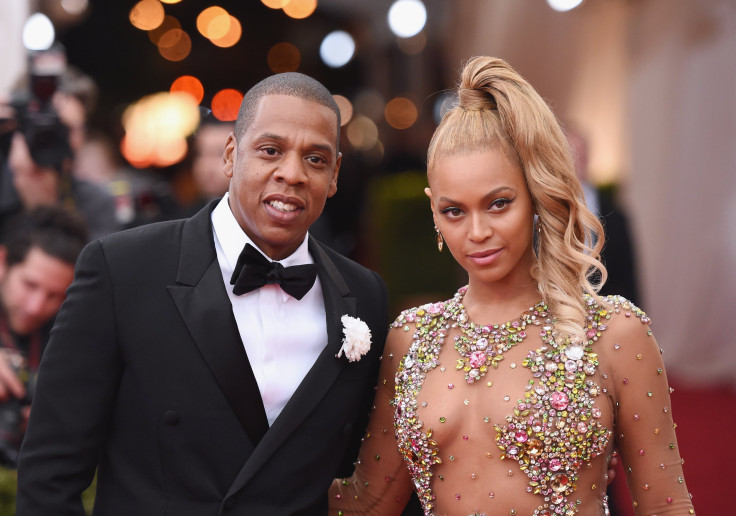Beyoncé Fans Step Out Of ‘Formation,’ Contradict Feminism Of ‘Lemonade’ Video After Cheating Rumors

Beyoncé on Wednesday kicked off her “Formation” tour, named for her hit single urging women, specifically African-American women, to band together to fight oppression. However, the fallout from the pop star’s landmark visual album “Lemonade” has many fans breaking rank with that philosophy.
"Lemonade," which premiered Saturday on HBO, sparked controversy after seemingly implying that Beyoncé’s husband, mogul Jay Z, had cheated on the pop star. However, most of her fans' internet rage has been directed toward the women linked to Jay Z, especially fashion designer Rachel Roy and singer Rita Ora, and not Jay Z himself. The backlash represents a contradiction for fans of Beyoncé who have championed the feminist themes and calls for solidarity the pop star has embraced in recent years. How can fans of the feminist artist justify tearing down another woman?
“We are living in a bizarre social media culture where we feel very close to celebrities. We are not just reading about them in magazines, but following their daily lives on Instagram,” Jill Filipovic, a contributor to Cosmopolitan who writes about politics and gender, told International Business Times. “It really crosses a line when we start mobbing people on the internet.”

That's exactly what happened to Roy. Soon after the release of “Lemonade,” Roy took to Instagram, writing, "Good hair don’t care, but we will take good lighting, for selfies, or self truths, always," an apparent reference to the “Becky with the good hair” lyric from “Lemonade.” Many fans responded by immediately launching a harassing internet smear campaign against Roy. Other suspected women, including Ora and even celebrity chef Rachael Ray, whom some fans confused with Roy, received similar treatment.
There's a long history of women being blamed when a man is unfaithful. The most famous example in recent history is Monica Lewinsky, a White House intern who became involved with President Bill Clinton in 1995. Lewinsky became a cultural pariah in the wake of the scandal while Clinton continued to be one of the most popular men in America — even though the Senate impeached Clinton in 1998, in part because of the scandal. Outside of politics, actress Angelina Jolie became the subject of much scorn after fellow actor Brad Pitt left his then-wife Jennifer Aniston for Jolie in 2005.
"Why are side chicks vilified while dudes who have side chicks are celebrated?" Robin M. Boylorn, an assistant professor of interpersonal and intercultural communication at the University of Alabama, wrote in a 2014 piece for Gawker. "The fact that men are not held accountable for their culpability in the destruction of their own relationships, and the onus is almost always and exclusively put on 'the other woman,' implies that men can't help it, that they are biologically wired to be promiscuous."
This is not what Queen Bey would have wanted. In her 2013 song “Flawless,” Beyoncé samples a portion of a speech by Nigerian writer Chimamanda Ngozi Adichie arguing that women are taught "to see each other as competitors, not for jobs or accomplishments, which I think can be a good thing, but for the attention of men." That echoes a prevailing theme in the pop star’s recent career that women should support and empower each other to overcome misogyny — culminating in 2016's “Formation."

Yet in "Lemonade" Beyoncé seems to point the finger squarely at the woman, singing "Ashes to ashes, dust to side chicks" and calling out "Becky with the good hair."
While blame might be uncalled for, Filipovic said Beyoncé’s personal anger toward the mysterious “Becky” is completely justified if someone did sleep with her husband.
“I don’t think there is a rule of feminism that you have to like any woman no matter what,” Filipovic said. “The idea of female niceness is inherently sexist.”
While Beyoncé may be free to rage in song and video, that does not give her millions of fans the green light to take up her fight online. Filipovic said that if fans want to be angry, then Jay Z should be the subject of their wrath.
Others have pointed out certain racially charged undertones in “Lemonade.” Naeemah Clark, an associate professor at Elon University in North Carolina who studies diversity in the media, wrote a piece for the Conversation arguing that Jay Z’s alleged infidelity is a product of a common African-American male search for validation of masculinity. Likewise, Clark argues that Beyoncé’s explicit decision in “Lemonade” to forgive Jay Z — he is shown kissing her feet in remorse at the end of the video — represents a feminist statement by a powerful black woman who certainly has the choice and means to walk away.
“Her decision to forgive — but clearly not forget — is her choice,” Clark wrote. “This is significant, too. Beyoncé’s black feminism celebrates the ability of black women to choose out of love, not necessity.”
© Copyright IBTimes 2024. All rights reserved.






















